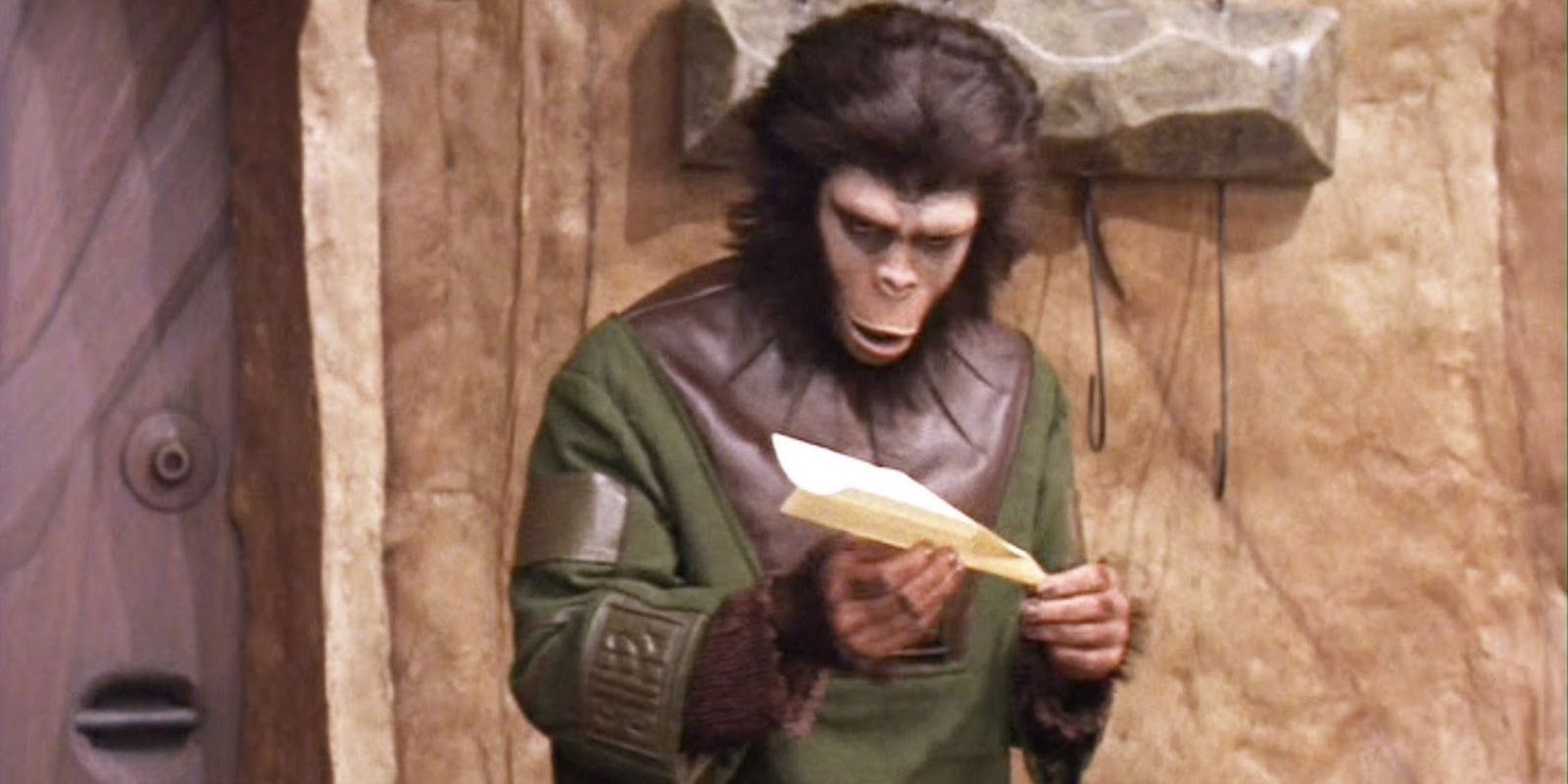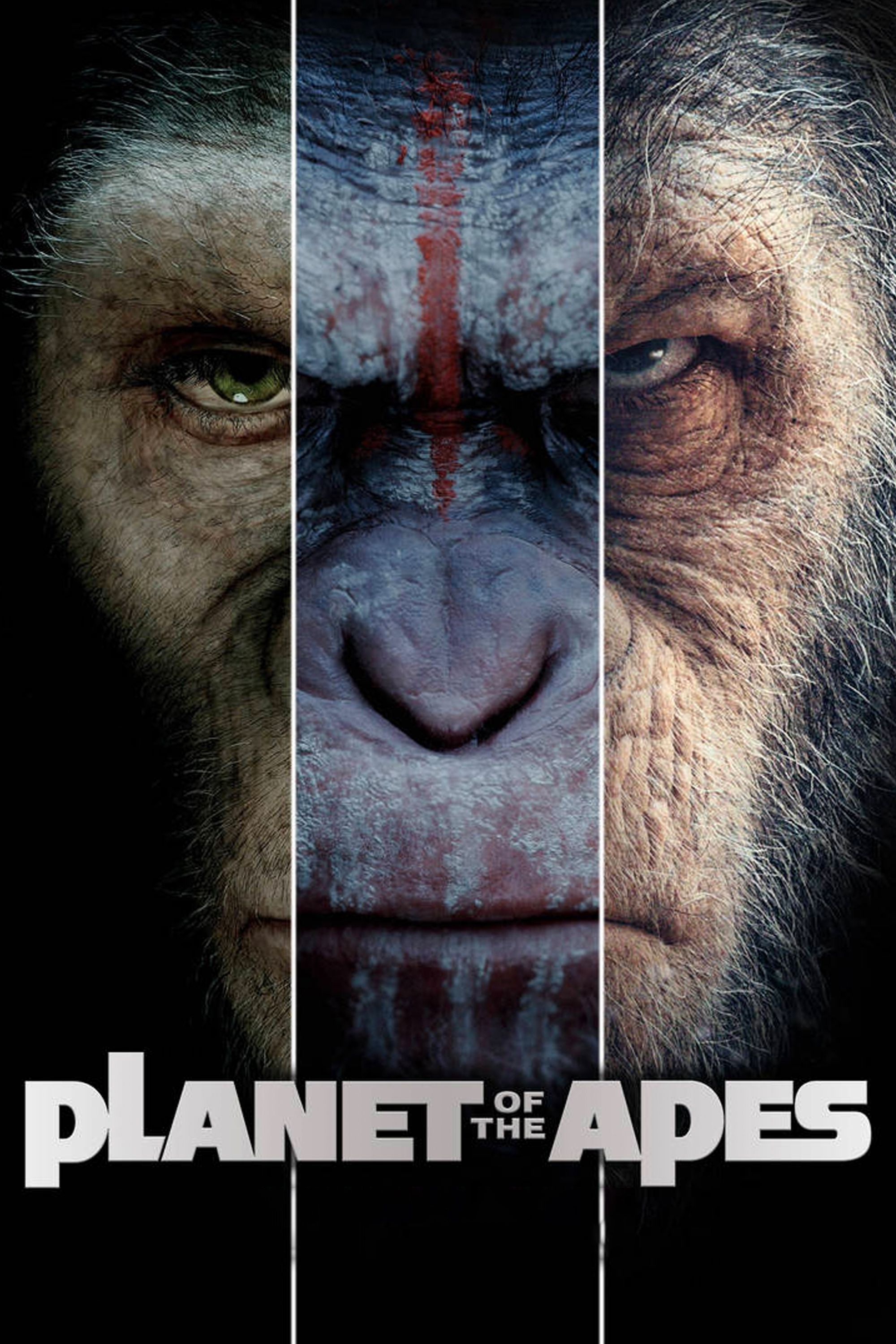Summary
- The Planet of the Apes movies have a complex timeline that spans from the original 1968 film to the upcoming Kingdom of the Planet of the Apes in 2024.
- Rise of the Planet of the Apes (2011) is the first film in the modern reboot trilogy, and the first movie chronologically.
- 1968's Planet of the Apes arrives in the middle of the franchise's timeline, despite being the first movie released.
From the original Charlton Heston films to the modern prequels, the Planet of the Apes movies have a complex timeline — one made even more intricate by an ill-fated 2001 Tim Burton project and the upcoming Kingdom of the Planet of the Apes. Based on the novel by French author Pierre Boulle titled Le Planete des singes, the original 1968 Planet of the Apes ranks among the most iconic science fiction films of all time. Across several sequels and reboots, the Planet of the Apes movies have built a continual timeline, though the chronological order doesn't match the order of release.
There are nine Planet of the Apes movies in the timeline so far, with the tenth, Kingdom of the Planet of the Apes, arriving in 2024. The original Planet of the Apes movies told the story of a future Earth where apes are civilized and humans devolved into a feral state. However, the 2011 reboot Rise of the Planet of the Apes went back in time to show how apes became the dominant species. The Planet of the Apes movies in chronological order journey from apocalyptic virus survival action to conceptual sci-fi, covering several decades of filmmaking.
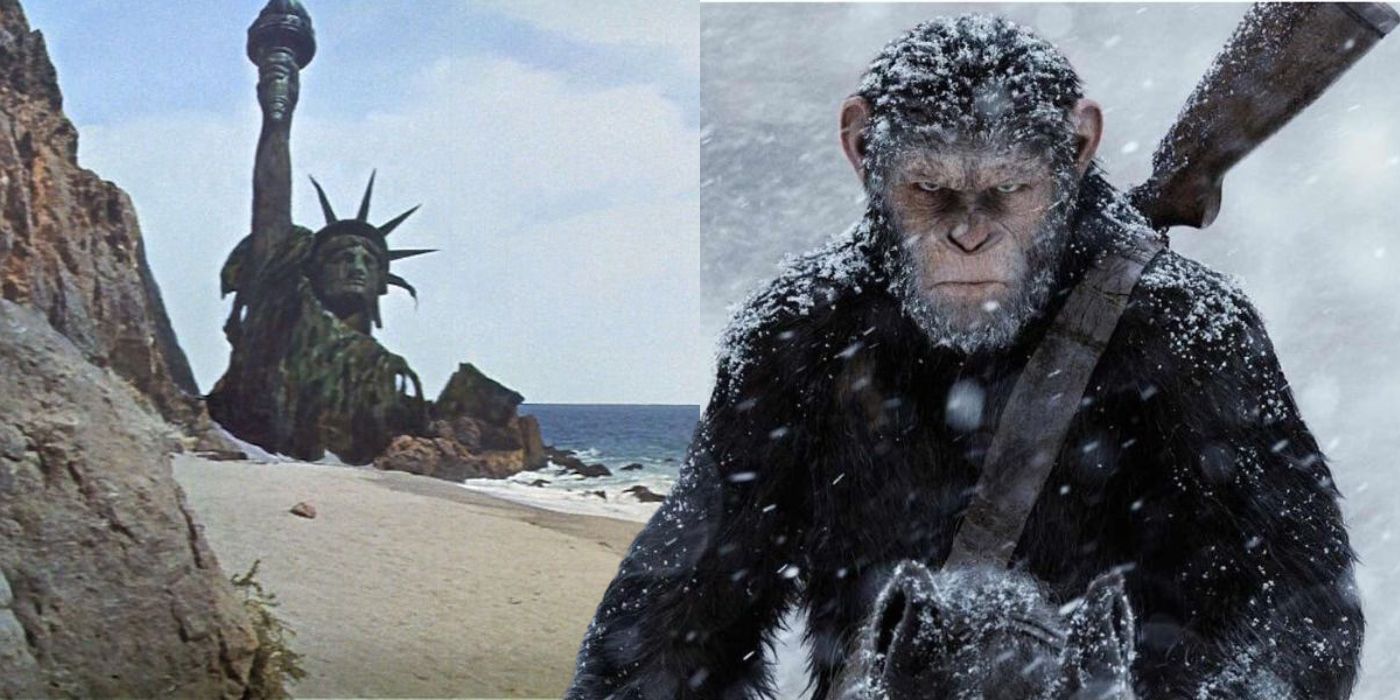
Planet Of The Apes: All Movie Timelines Explained
A complete guide to every timeline introduced in the Planet of the Apes franchise, from the original timeline to the prequels' timeline.Rise of the Planet of the Apes (2011)
Caesar Leads A Rebellion
Rise of the Planet of the Apes
- Release Date
- August 5, 2011
- Director
- Rupert Wyatt
- Cast
- James Franco , Andy Serkis , Tom Felton , John Lithgow
- Runtime
- 1h 45m
The first film of the rebooted trilogy is the first of the Planet of the Apes movies in order based on the history of its timeline. Rise gave a unique spin on the Planet of the Apes movie series as it focuses on an ape named Caesar who, after having his intelligence augmented through science experiments, leads an ape rebellion while releasing a virus that brings humanity to its knees.
Critics gave the film positive reviews, praising the performances and screenplay, while the movie got an Oscar nomination for its visual effects.
One of the greatest aspects of this trilogy that started in Rise of the Planet of the Apes was the motion capture technology for Andy Serkis to play the protagonist, Caesar, creating a digital character who felt easy to connect with emotionally and lead the story without relying on the human characters. Critics gave the film positive reviews, praising the performances and screenplay, while the movie got an Oscar nomination for its visual effects.
Rise of the Planet of the Apes is available to stream on Hulu.
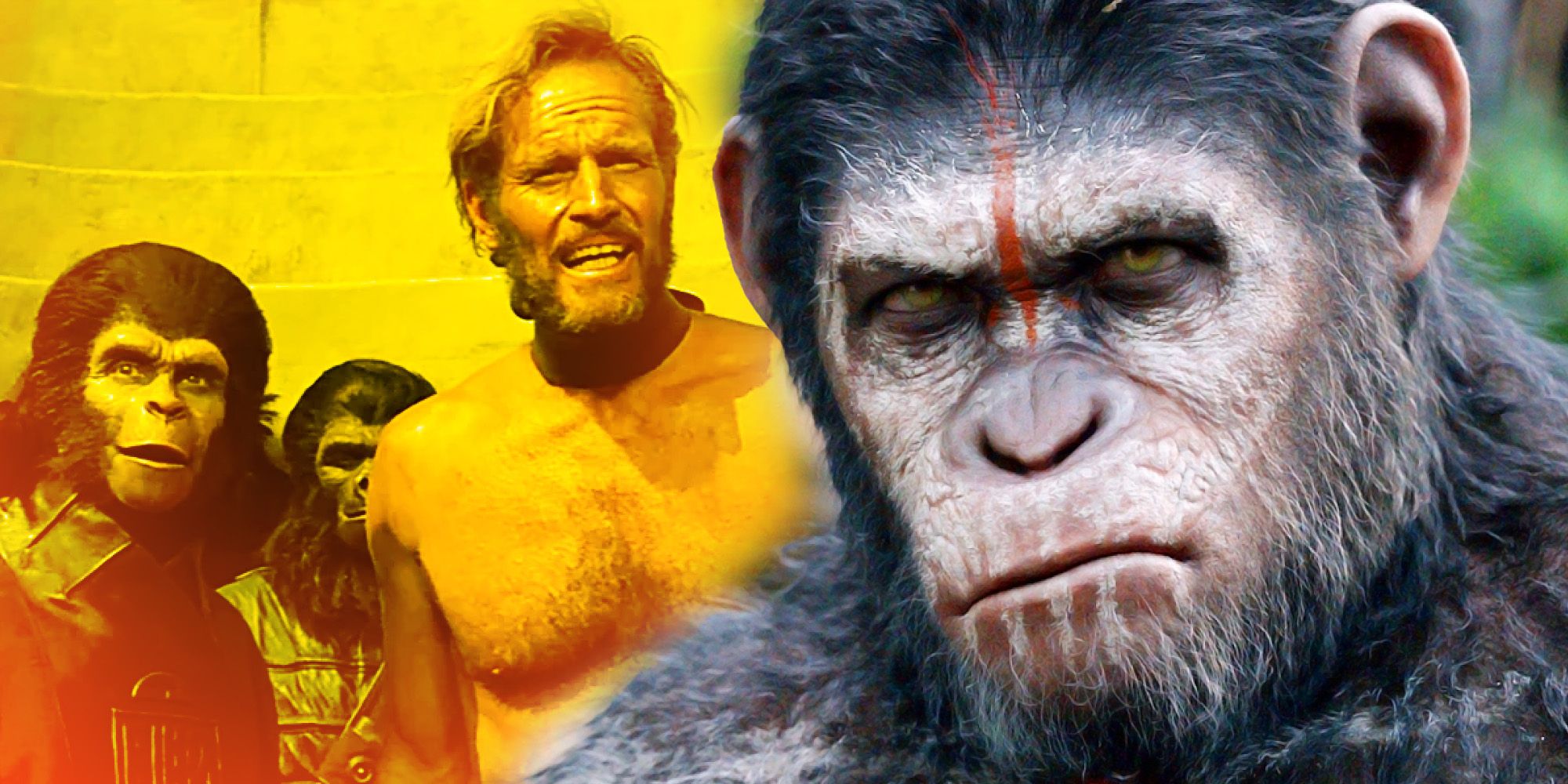
6 Biggest Differences Between Planet Of The Apes' Reboot Timeline & The Original Movies
The modern Planet of the Apes franchise re-imagines many elements of the original series, and makes some big changes to them.Dawn of the Planet of the Apes (2014)
The Uneasy Coexistence Between Apes And The Remaining Humans
Dawn of the Planet of the Apes
- Release Date
- July 11, 2014
- Director
- Matt Reeves
- Cast
- Keri Russell , Andy Serkis , Judy Greer , Gary Oldman , Kirk Acevedo , Jason Clarke
- Runtime
- 2h 11m
2014's sequel to Rise of the Planet of the Apes, titled Dawn of the Planet of the Apes, is the next movie chronologically in the Planet of the Apes timeline. The motion capture technology also continued to improve. While the apes may not have been exactly lifelike, their performances felt real, which was essential as the human characters became less of the focus in this world.
Dawn of the Planet of the Apes is set 10 years after the outbreak of Simian Flu. The human population has been decimated since only 1 in 500 are immune. This sequel showed the ape population continuing to grow more organized and self-aware, while the human population drew closer to extinction. Matt Reeves stepped into the director's chair for the sequel and delivered an action-packed movie with emotional nuance that pushed the franchise forward.
Dawn of the Planet of the Apes is available to stream on Hulu and Max.
War for the Planet of the Apes (2017)
Humanity's Last Stand Against The Apes
War for the Planet of the Apes
- Release Date
- July 14, 2017
- Director
- Matt Reeves
- Cast
- Judy Greer , Steve Zahn , Mercedes de la Zerda , Max Lloyd-Jones , Woody Harrelson , Alessandro Juliani , Amiah Miller , Terry Notary , Andy Serkis , Aleks Paunovic , Ty Olsson , Devyn Dalton , Gabriel Chavarria
- Runtime
- 2h 20m
The final film in the rebooted Planet of the Apes trilogy was regarded by some as the best of the franchise. This film's absolute mastery helped cement Matt Reeves' Planet of the Apes movies as one of the greatest trilogies in both the sci-fi genre and in film history. Serkis continues to impress with his motion-capture portrayal of Caesar as a burdened leader and Moses figure, leading to a campaign to make him the first actor nominated for an Oscar in a motion-capture role.
It served as a poignant and exciting end to the story of Caesar while also seeing the end of humankind's time as the dominant species on the planet.
While Serkis's work didn't get the award recognition some were hoping for, it served as a poignant and exciting end to the story of Caesar while also seeing the end of humankind's time as the dominant species on the planet. There is also less of a time jump between War for the Planet of the Apes and the previous movie, with only two years passing since the events of Dawn of the Planet of the Apes, as opposed to the decade that passed between the first and second films in the trilogy.
War for the Planet of the Apes is available to stream on Hulu and Max.
Kingdom of the Planet of the Apes (2024)
The Ape Population Is Divided After Caesar
Kingdom of the Planet of the Apes
- Release Date
- May 10, 2024
- Director
- Wes Ball
- Cast
- Kevin Durand , Freya Allan , Peter Macon , Owen Teague , Eka Darville , Sara Wiseman , Neil Sandilands
- Distributor(s)
- 20th Century
In 2024, Matt Reeves' Planet of the Apes franchise gets a sequel in Kingdom of the Planet of the Apes. The movie moves into the future, with The Maze Runner director Wes Ball replacing Reeves behind the camera. The lead character also changes to Noa (Owen Teague), an ape living generations after the events of War for the Planet of the Apes. Noa will be fleeing a new tyrannical leader who is perverting the teachings of Caesar.
Kingdom of the Planet of the Apes also sees humans reverting to a more feral state while the apes have split up into different clans across the oasis, placing this right before the original franchise when watching the Planet of the Apes movies in timeline order. Of all the modern Planet of the Apes so far, Kingdom of the Planet of the Apes is the first one where earth is starting to resemble the future Charlton Heston's George Taylor arrives at in the 1968 original.
Kingdom of the Planet of the Apes hits theaters on May 24, 2024
Planet of the Apes (2001)
The Ill-Fated Remake Of The 1968 Original
Planet of the Apes (2001)
- Release Date
- July 27, 2001
- Director
- Tim Burton
- Cast
- Mark Wahlberg , Tim Roth , Helena Bonham Carter , Paul Giamatti , Michael Clarke Duncan , Kris Kristofferson
- Runtime
- 120 Mins
The Tim Burton-directed reboot of the Planet of the Apes movies had a lot of hype going into it. However, this Mark Wahlberg-starring film was a critical disaster with many calling it the worst of the franchise. Although many technical aspects such as the makeup of the apes received praise, critics complained that the actual storytelling of this movie was left wanting.
Tim Burton's Planet of the Apes had a unique and clever ending twist that did a great job of living up to the original without copying it. Unfortunately, that wasn't enough to save this movie, and it ended any chance of further movies for a full decade. To date, it remains the only Planet of the Apes movie set outside of the official timeline and can be skipped when watching in chronological order.
Tim Burton's Planet of the Apes is available to stream on Hulu.
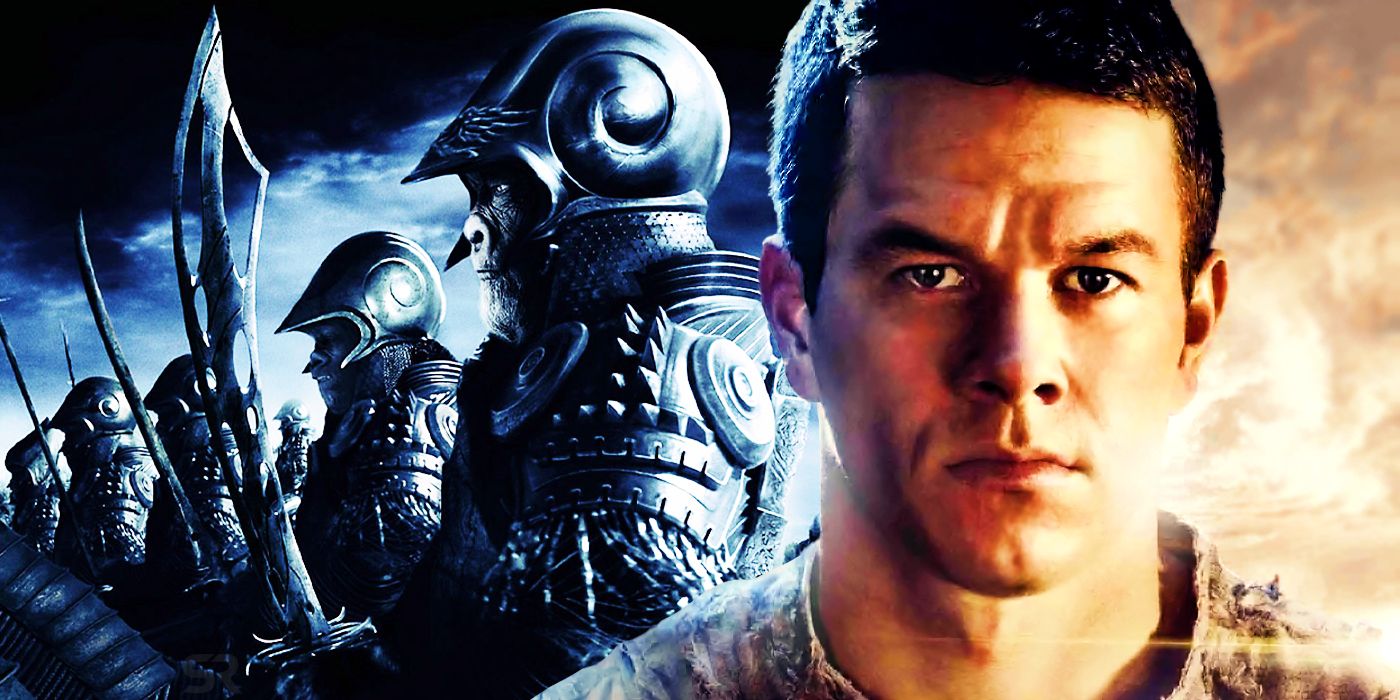
Why Tim Burton's Planet Of The Apes Never Got A Sequel
Tim Burton’s 2001 reboot of the Planet of the Apes was an interesting take, but, despite a setup, it never received a sequel of follow-up.Planet Of The Apes (1968)
The Strange Planet Ruled By Humans Is Discovered By An Outsider
Planet of the Apes (1968)
- Release Date
- April 3, 1968
- Director
- Franklin J. Schaffner
- Cast
- Charlton Heston , Roddy McDowall , Kim Hunter , Maurice Evans , James Whitmore , James Daly , Linda Harrison , Robert Gunner
- Runtime
- 112 Minutes
In the original Planet of the Apes movie, released in 1968, Charlton Heston stars as astronaut George Taylor, who lands on a strange planet. Taylor is horrified to find out that this planet is actually ruled by an extremely intelligent race of apes. Humans, on the other hand, have a seriously diminished mental capacity and simply serve as animals and pets of their ape overlords. While this was the first movie made in the franchise, it took place later in the Planet of the Apes' timeline.
The iconic Planet of the Apes twist ending revealing that Taylor was not on an alien planet, but rather a post-apocalyptic Earth, set up the franchise
The iconic Planet of the Apes twist ending revealing that Taylor was not on an alien planet, but rather a post-apocalyptic Earth, set up the franchise to later explore how the world became ruled by apes. This film won several impressive awards, including winning an honorary Oscar for outstanding makeup achievement. The Library of Congress added it to the National Film Registry in 2001.
Beneath the Planet of the Apes (1970)
An Astronaut Explores The Planet To Find His Missing Colleagues
Beneath the Planet of the Apes
- Release Date
- April 23, 1970
- Director
- Ted Post
- Cast
- James Franciscus , Kim Hunter , Maurice Evans , Linda Harrison , Paul Richards , Victor Buono
- Writers
- Pierre Boulle , Paul Dehn , Mort Abrahams
The follow-up to the original 1968 classic was 1970's Beneath the Planet of the Apes. Compared to the original, Beneath the Planet of the Apes did not come close to achieving the same level of success or cultural impact. Starring James Franciscus with Charlton Heston returning in a supporting role, it failed to capture what the first film was all about. The movie is a direct sequel to the original with it focusing on another spacecraft arriving and going in search of Taylor (Heston).
Although it was a success at the box office, Beneath the Planet of the Apes was lambasted by critics. Many of the sequel's detractors described it as childish and lacking the interesting storytelling of the original. However, its success was key to the franchise continuing on and building on the timeline.
Escape from the Planet of the Apes (1971)
Apes Time-Travel To Explore The History Of Their Planet
The third movie of the franchise released in as many years, Escape from the Planet of the Apes was the most critically acclaimed of the original Planet of the Apes movies outside the initial 1968 film. While the original movie showed Taylor traveling from the present to the eponymous Planet of the Apes, in this movie the characters Cornelius and Zira used his spaceship to travel back in time to 1973.
Escape from the Planet of the Apes did the job better than any of the other original sequels of replicating what made the original so well received
Escape from the Planet of the Apes did the job better than any of the other original sequels of replicating what made the original so well received, despite the fact it arguably switched up the formula the most. Reversing the situation by sending the apes to the past was a clever twist that kept the franchise interesting. This time travel also meant that part of the movie was actually earlier in the Planet of the Apes timeline than the two previous movies.
Conquest of the Planet of the Apes (1972)
The First Version Of Caesar's Rebellion
Conquest of the Planet of the Apes
- Release Date
- June 30, 1972
- Cast
- Roddy McDowall , Ricardo Montalban , Severn Darden
- Writers
- Paul Dehn , Pierre Boulle
The third sequel to the original movie, 1972's Conquest of the Planet of the Apes, shows the rise of Caesar, who is a sort of mythological figure and savior who is said to bring about the actual Planet of the Apes. In this new world of 1991, a space-borne illness wiped out cats and dogs, leading to apes becoming humans' new pets of choice. Hoping to begin a movement and lead a revolution to free the apes, Caesar frees numerous apes and begins a plan to free more.
It's an intriguing entry in the Planet of the Apes franchise, serving as a prequel to the 1968 original while also introducing multiple new concepts of its own. While Conquest of the Planet of the Apes was quite original in its story, it was very average in its execution. It had minimal critical or box office success. The retelling of Caesar's rebellion in the later movies helped to make him a more iconic character.
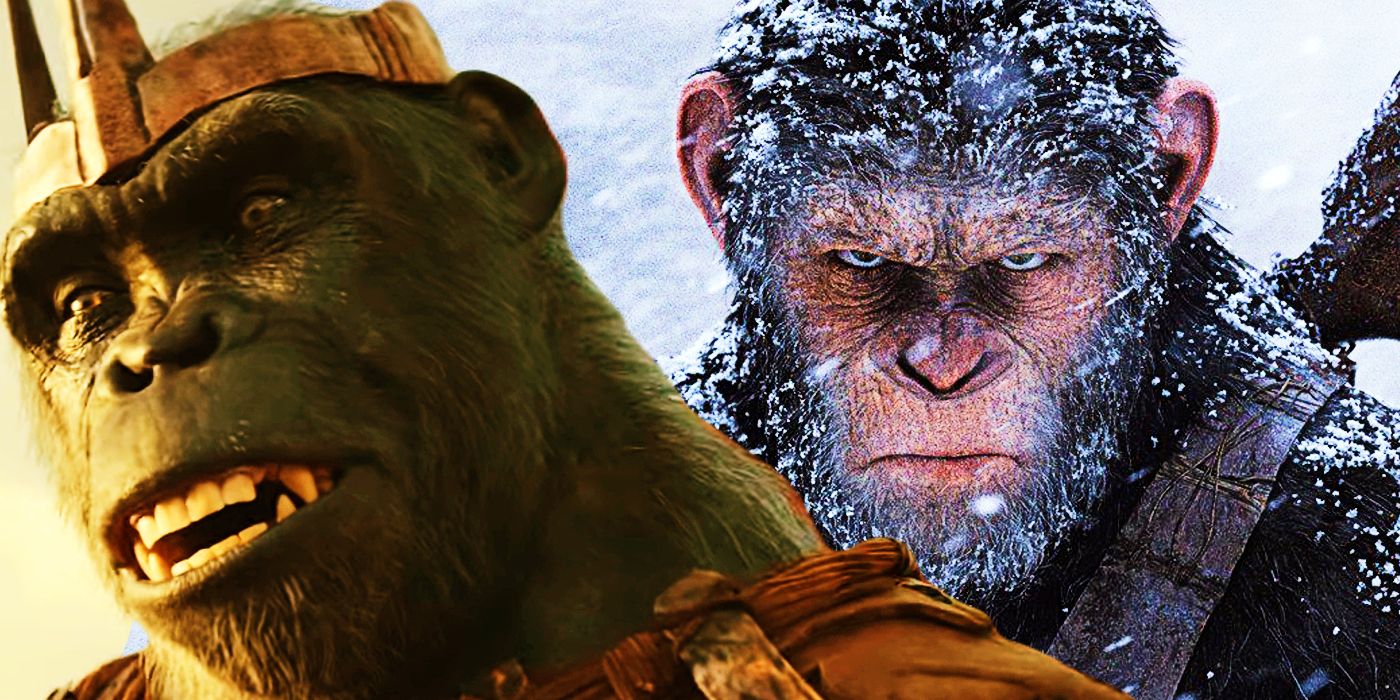
Kingdom Of The Planet Of The Apes' New Ruler Is Caesar's Worst Nightmare
The new ape ruler shown in the trailer for Kingdom of the Planet of the Apes has either perverted Caesar's teachings or ignored them entirely.Battle for the Planet of the Apes (1973)
Caesar Seeks A Peace With Humans
Battle for the Planet of the Apes
- Release Date
- June 15, 1973
- Cast
- Roddy McDowall , Severn Darden , John Huston
- Writers
- Pierre Boulle , Paul Dehn , John William Corrington
The final film when watching the Planet of the Apes movies in chronological order, 1973's Battle for the Planet of the Apes, showed Caesar and his forces finally winning their freedom. Humanity has been all-but-destroyed by nuclear war, and the impact this has had on the planet creates a situation of scarcity. However, ape's reign supreme and have enslaved the remaining humans. Toward the end of the movie, Caesar decides to end the vicious cycle and spare the humans. Instead, the two races live together as equals.
The poor reception of the movie would end the franchise for several decades until it was attempted to be revitalized with the 2001 remake.
Battle for the Planet of the Apes was the lowest-grossing film in the entire series. Acclaimed film critic Roger Ebert described the film as "the last gasp of a dying series." Indeed, the poor reception of the movie would end the franchise for several decades until it was attempted to be revitalized with the 2001 remake.


